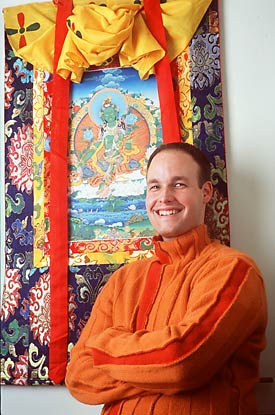Old soul
Ary sees himself as a bridge between East and West

When Elijah Ary was 4, he began telling his parents about a place he visited in dreams that he called “my planet.”
They listened to these stories with amusement at first, attributing them to their son’s power of invention. Then something happened that forced them to change their minds.
A Tibetan monk named Geshe Pema Gyaltsen visited their home in Montreal. The Arys had become converts to Buddhism several years before. Later, Elijah told his parents that the monk reminded him of a teacher he had had when he lived on “his planet,” and he listed the names of others he had known there.
When Elijah’s father told Geshe Gyaltsen what his son had said, the monk’s response surprised him. The names Elijah had mentioned were fellow monks whom Gyaltsen had known years ago at his monastery in Tibet.
When Gyaltsen returned to India (where many Tibetan Buddhist monasteries have relocated to escape persecution by the Chinese), he began researching Elijah’s stories. Four years later, he wrote to the Arys that he was certain Elijah was the reincarnation of Geshe Jatse, a Tibetan teacher and scholar who died in the mid-1950s.
A letter from the Dalai Lama confirmed Gyaltsen’s conclusions and said that this was the first time someone from the Gelugpa school of Buddhism (of which the Dalai Lama is the head) had reincarnated in the West.
Now a graduate student and teaching fellow in the Study of Religion, Ary often tells his life story to his students, supplementing it with a film about him by Marcel Poulin titled “Memories From a Previous Life.”
“I’ve shown the film a number of times at Harvard to different classes,” Ary says, “and for a lot of people it’s been an eye-opener. It shows them that there may be something about the world they didn’t take into account, and that opens their minds and I think makes a difference in their lives for the better.”
As the film makes clear, Ary’s odyssey has not always been an easy one, either for him or for his family. Despite being practicing Buddhists, Ary’s parents were not prepared to send their young son to study in India, as the monks of Sera monastery expected them to. For years they tried to find an alternative, seeking out less remote Buddhist centers where Ary could learn Tibetan and study Buddhist scriptures.
None of these arrangements worked out. Meanwhile, Ary continued to remember specific details of his former life, details so obscure, he says, that there was no way he could have heard or read about them.
Finally, when he was 14, his parents decided to let him go. For Ary, who had been bored in Western schools and troubled by a sense of difference, this immersion in Tibetan Buddhist studies was a revelation. He learned Tibetan in nine months, well enough to engage in high-pressure debates about the fine points of Buddhist philosophy. He also says that he could recite certain Tibetan texts by heart, despite never having seen them before.
“There are a lot of questions that have been answered in my life, and I don’t see how they could be answered in any other way. So if reincarnation doesn’t exist, it doesn’t seem to make sense to me.”
Ary remained at the monastery for six years, studying up to 14 hours a day and becoming almost completely absorbed in the world of Tibetan Buddhism.
Almost, but not quite. A part of him remained rooted in the West, and he began to wonder why he had been reincarnated here. He decided that the purpose of his life was to be a bridge between East and West.
“I’d been thinking that maybe it would be a good idea to get a Western education. I felt that by staying in the monastery, I couldn’t be as beneficial in other people’s lives as I wanted to be.”
The Dalai Lama agreed. During a brief meeting, he told Ary: “I think you should go back and study and become a professor. You don’t have to be a monk to be a good Buddhist.”
Since then, Ary has reclaimed the identity he left behind. A fourth-year graduate student, married to his childhood sweetheart, and whose leisure activities include playing ice hockey and watching action films, Ary looks forward to a career teaching Buddhist and Tibetan studies.
“What I really like about students is that they constantly challenge you and challenge what the tradition has to say.”
He also enjoys challenging them in turn, shaking up their preconceptions by presenting them with the story of his own life. But when he puts his personal facts before them, it is not to enhance his own spiritual authority, but rather to demonstrate that behind the seemingly mundane can lurk the miraculous.
“The important thing isn’t who I was. It’s what I’m doing now. If I can have a positive impact with my life this time around, then it’s all the better. That’s really what I’m here for.”




